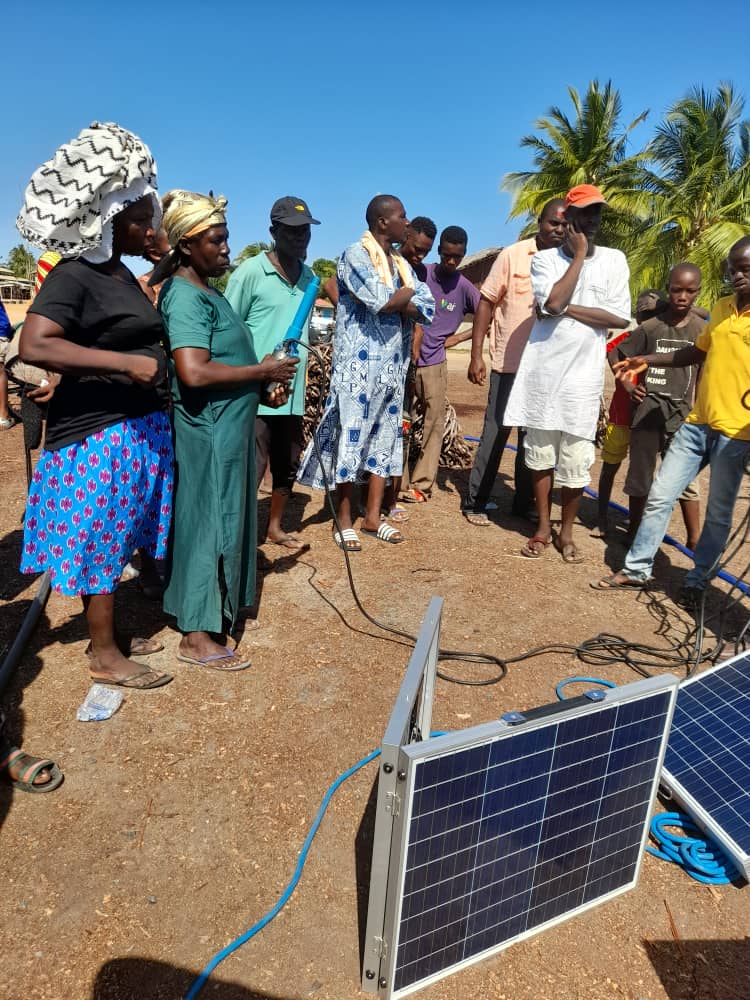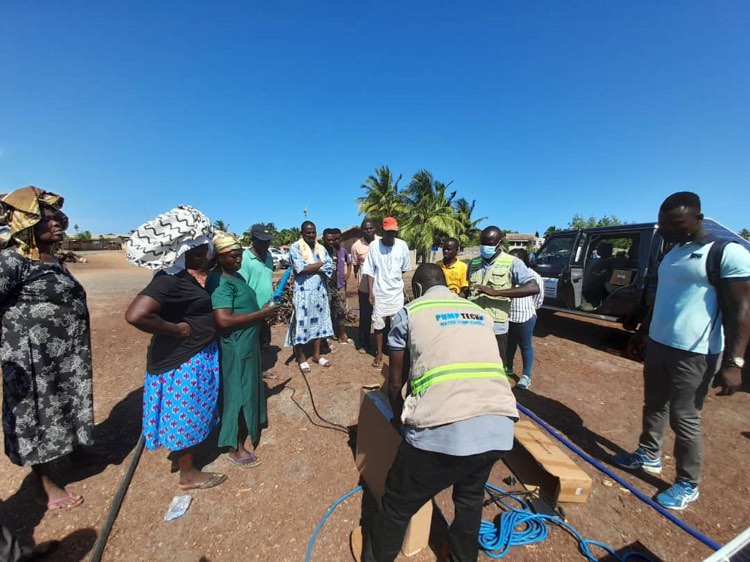by Thai Thi Minh, Senior Researcher, Scaling Innovations, International Water Management Institute, and Nicole Lefore, Director, The Feed the Future Innovation Lab for Small Scale Innovation, Texas A & M.
Providing asset-based financing is considered an innovation that can enable people ‘at the bottom of the pyramid’, including women farmers, to overcome credit barriers. In sub-Saharan Africa, several solar irrigation pump companies are attempting to fill a widespread credit gap by offering asset-based financing, through which they essentially provide farmers with a loan to purchase a pump, for which the pump itself serves as security.
The advantage of asset-based financing is that it can give farmers access to solar pumps without the usual collateral or credit history required for a loan. This enables them to intensify production and increase their incomes. Farmers pay back the loans in installments, as the pump allows them to increase their incomes, in what is known as a pay-as-you-go (PAYGO) approach. PAYGO also sometimes includes follow-up training and regular product servicing during the period of repayment, which also fills the need for information and after-sales services.
Companies are benefitting from asset-based financing by expanding their markets, while farmers benefit from avoiding the usual credit barriers. But, while innovative, the question is whether asset-based financing is also inclusive when it comes to solar irrigation pumps?
Women in sub-Saharan Africa play a critical role in food security, providing as much as half of agricultural labor and playing significant roles in agriculture and livestock sectors. Yet, gender-based constraints to financial resources—such as loans, formal banking services, and ownership over land and other resources—negatively affect women’s ability to invest in productive assets, such as solar pumps.
Recent research by the Feed the Future Innovation Lab for Small Scale Irrigation (ILSSI), published by the International Food Policy Research Institute (IFPRI), highlights that women seeking credit face more significant supply and demand constraints, such as a lack of information, than men.

While many development projects focus on improving women’s access to credit through village savings and loans associations or support through micro-finance institutions, such modes are either insufficient, unprofitable, or fail to reach resource-poor women and men farmers wanting to invest in productive assets. That’s why we are exploring how well asset-based financing enables women to invest in irrigation.
Gender gaps in current credit assessment tools
Companies considering providing asset-based financing to clients typically use credit scorecards to determine whether the client is creditworthy.
Such scorecards or assessment tools are used by a company’s credit review officers to assess commercial aspects of financing and to give a potential client a risk score and a consistency rating. If a potential client is assessed as low risk, and therefore qualifies for credit, the results of the assessment can also be used to set the terms of repayment. In short, credit assessments are a critical tool that aims to reduce the risks associated with asset-based financing for both the loan providers and for clients.
Within the ILSSI project, the International Water Management Institute (IWMI) has reviewed credit scorecard criteria and the credit assessment processes being applied by private solar irrigation suppliers in sub-Saharan Africa offering PAYGO or some form of asset-based financing. The initial review suggests women may still be excluded because the scorecard criteria may be inherently biased.
While credit risk assessment tools are to predict the likelihood of repayment, they are not necessarily designed to be gender sensitive. In fact, few of the irrigation equipment companies with which ILSSI has engaged target women farmers as potential clients for solar irrigation pumps.

We found that typical criteria in credit assessments include access to services and amenities, primary income-generating activity and income, household expenses, and water availability and utility, as well as the client’s farm and farming practices, existing credit access, and financial savings. In this way, use of resource ownership and income as criteria to assess the potential risk of agricultural clients marginalizes most women, as they tend to be resource poor.
At the same time, scorecard criteria exclude the factors known to influence women’s ability to achieve investment returns and repay credit, such as off-farm income, livelihood diversification, group membership and social networks, and financial management. Women farmers may not have the level of income or asset ownership to meet a threshold for low-risk financing, but women farmers may still have strong financial management capacity, awareness about availability of various financial services, and financial literacy. Women farmers generally also have diverse on- and off-farm livelihood activities, which a credit scorecard may not account for. We propose that including these income-generating activities would help better estimate the credit worthiness of women farmers.
Moreover, credit assessment criteria appear to miss the significance of group membership and social networks as well as socio-cultural aspects, such as power relations within households, women’s mobility, inheritance systems, and other socio-cultural relations that influence women’s access to resources such as finance, markets and extension, or information sources.
Creating equal opportunities for women farmers
We are now collaborating with private-sector solar irrigation equipment partners to develop gender-sensitive credit scorecard criteria. The gender-sensitive tool focuses on both the criteria components and the process. Criteria currently excluded, but that could influence women farmers’ ability to obtain and maintain PAYGO loans, will be brought into credit assessments. These additional criteria should also help to develop business models for asset-based lending to groups, which would allow women to pool their resources into a joint asset. ILSSI’s private sector partners will test the application of the new criteria in Ghana and Ethiopia.
We will be supporting continued development of the credit assessments in parallel with capacity development innovations. In Ghana, ILSSI is supporting innovation internships that are embedding young and promising researchers into company activities, including fieldwork on business and financing models to reach women farmers. ILSSI activities in Ethiopia include a ‘hack-a-thon initiative’ by IWMI and Bahir Dar University to develop an app-based digital scorecard to ease the data collection and analysis and improve the assessment algorithm.
Asset-based financing is seen as a high potential solution to credit constraints, building on the strengths of the private sector in development, but if poorly designed, this innovation could inadvertently deepen women’s lack of access to credit for productive assets. Reversely, if credit assessment tools are adapted to assess the creditworthiness of women farmers more accurately, there is potential for the approach to benefit both women and men farmers as well as private sector companies in a growing solar irrigation market.


